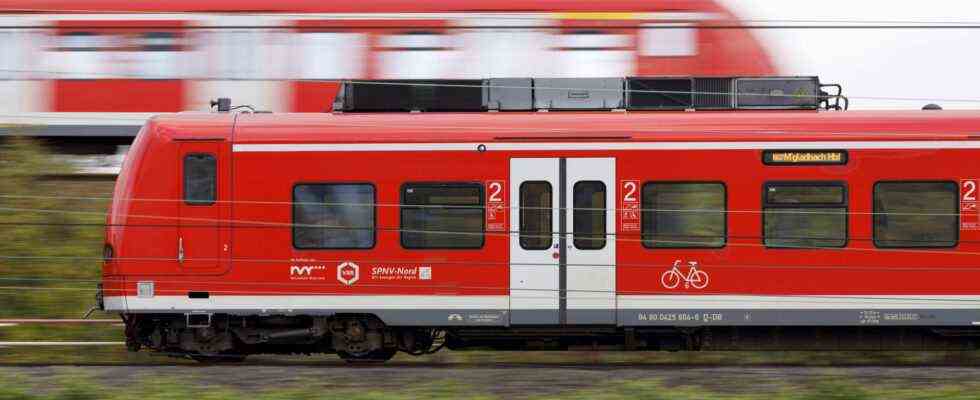Status: 05.11.2021 3:16 p.m.
The federal election has rekindled the debate about separating the network and operations at Deutsche Bahn. Experience from abroad shows the advantages and disadvantages of such a split.
After the separation of the network and operations at Deutsche Bahn was not an issue in recent years, the debate has now flared up again. At the latest since the publication of a position paper in August in which a broad alliance of consumer advocates, the Pro Bahn passenger association, the construction industry and the GDL train drivers’ union pleaded for a split of the railway, the topic has been back on the agenda. Today the Monopoly Commission also called for the Deutsche Bahn to be split up into two independent companies.
CEO Richard Lutz is also a proponent of such a reform. He likes to refer to examples from other countries, above all Japan, where the rail system, which is separate from rail and operation, works perfectly. Critics, on the other hand, point to integrated corporations such as the Swiss Federal Railways SBB, which have always refused to split up and yet are considered a prime example of high-quality and reliable train services.
“No longer fits in the modern world of traffic”
In fact, there is no shortage of arguments on either side. “We need a fundamental new beginning in rail policy,” says Claus Weselsky, head of the train drivers’ union GDL in a joint position paper with other associations. The core of such a rail reform 2.0 must be the separation of network and operation. Klaus Müller from the Federation of German Consumer Organizations (vzbv) also calls for the end of the current monopoly of Deutsche Bahn AG in the statement.
The private competitors express themselves similarly. Ludolf Kerkeling from the European Railways Network (NEE) says: “The concept of the integrated DB group no longer fits into the modern world of transport.” Because the many private railways needed neutral service providers in the infrastructure to ensure fair competition. It should also not be forgotten that a rail operator like DB, which owns the network and thus the network revenues and also decides on network access for competitors, has an unjustified advantage.
Opponents warn of negative effects on the overall system
Bernhard Knierim from the action alliance is against it Railway for everyone, An association of trade unions, citizens’ groups and left groups like Atttac, have a completely different opinion. “The interests of a pure network operator and a pure transport company are different. Accordingly, both optimize their costs in their own way, which often runs counter to the interests of the other side and has negative effects on the rail system as a whole,” he wrote in a recently published position paper.
The alliance receives support from the rather conservative railway workers’ union EPP. Its deputy chairman, Martin Burkert, warns that the separation of rail and operation is so complex that the railway will be busy with its own renovation for years to come. In view of the ambitious deadlines for climate protection, that would be rather counterproductive.
Examples from Switzerland and Great Britain
The opponents refer primarily to the example of Switzerland. The railway system there is considered to be the best in Europe, with a perfectly coordinated integral timetable and reliable traffic. The Swiss Association of Public Transport (VöV) also came to the conclusion years ago that the risks of a split are too great compared to the benefits, according to a corresponding study. The positive effects of a separation are also less than expected. Overall, the association is of the opinion that the “separation philosophy propagated at EU level is a fundamental error”.
The example of Great Britain, which implemented an extreme model of separation of its railways under the Thatcher government, serves as a deterrent. British Rail was split up into Railtrack and 25 operating companies. However, the model failed completely. A study commissioned by the British state has shown that every kilometer that a passenger travels by train causes total costs of the equivalent of 24.3 euro cents in Great Britain, whereas in Switzerland, the equivalent of 13.5 euro cents, only half as much.
Cancellation of the separation in France
Critics also see France as an example of a failed separation. There, the government withdrew the separation of network and operation in 2015. The network operator company Réseau ferré de France (RFF), which was only founded in 1997, was dissolved as an independent company and integrated into the operator company SNCF. The government at the time justified the move by stating that the separation had brought no benefit at all; neither for passengers, nor for taxpayers and operators. “In an integrated group, everyone works with one another, in separate companies each for himself and thus often against each other,” wrote the business newspaper “Les Echos” at the time.
The Swedes seem to have had better experiences with a separate railway system. The country pioneered vertical separation in 1988, removing infrastructure management (Banverket) from train operations (SJ). Both companies remained in public hands. The operator SJ still has a monopoly on all long-distance train connections. Nevertheless, the deregulation of freight and passenger traffic opened the way for newcomers to the market and enabled more competition in the industry, according to a study by the Bundestag’s scientific service. In particular, the quality of passenger transport has improved and freight customers have more choice.

